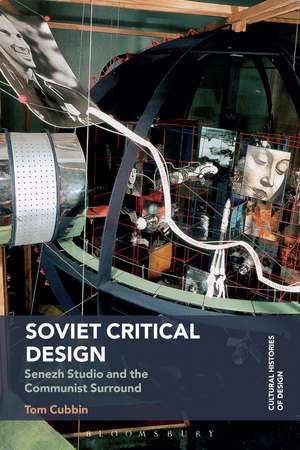Soviet Critical Design: Senezh Studio and the Communist Surround: Cultural Histories of Design
Autor Tom Cubbinen Limba Engleză Hardback – 12 dec 2018
| Toate formatele și edițiile | Preț | Express |
|---|---|---|
| Paperback (1) | 187.26 lei 3-5 săpt. | +49.11 lei 4-10 zile |
| Bloomsbury Publishing – 8 mar 2023 | 187.26 lei 3-5 săpt. | +49.11 lei 4-10 zile |
| Hardback (1) | 598.02 lei 3-5 săpt. | |
| Bloomsbury Publishing – 12 dec 2018 | 598.02 lei 3-5 săpt. |
Preț: 598.02 lei
Preț vechi: 858.34 lei
-30% Nou
Puncte Express: 897
Preț estimativ în valută:
114.43€ • 119.48$ • 94.49£
114.43€ • 119.48$ • 94.49£
Carte disponibilă
Livrare economică 25 martie-08 aprilie
Preluare comenzi: 021 569.72.76
Specificații
ISBN-13: 9781350021990
ISBN-10: 1350021997
Pagini: 248
Ilustrații: 48 b/w illustrations
Dimensiuni: 156 x 234 x 25 mm
Greutate: 0.5 kg
Editura: Bloomsbury Publishing
Colecția Bloomsbury Visual Arts
Seria Cultural Histories of Design
Locul publicării:London, United Kingdom
ISBN-10: 1350021997
Pagini: 248
Ilustrații: 48 b/w illustrations
Dimensiuni: 156 x 234 x 25 mm
Greutate: 0.5 kg
Editura: Bloomsbury Publishing
Colecția Bloomsbury Visual Arts
Seria Cultural Histories of Design
Locul publicării:London, United Kingdom
Caracteristici
Written by an emerging scholar who already has an excellent reputation in the field, and who has already worked with us on the Bloomsbury Encyclopedia of Design
Notă biografică
Tom Cubbin is a senior lecturer in design studies at the Academy of Design and Crafts, Gothenburg, Sweden. He contributed to the Bloomsbury Encyclopedia of Design, and has had several articles published in Home Cultures, Estonian Art, and the Calvert Journal.
Cuprins
Introduction: The Communist SurroundSocialist Objects as Critical DesignThe Communist SurroundThe Language of Soviet DesignLate SocialismConclusion Chapter 1: Art, Technology and Design in the Soviet ThawTechnical Aesthetics as a 'Science of Design'Theories of Design in Art and AestheticsProblems of DesignForeign InfluencesFrom Chaos to HarmonyThe Production Art of the FutureObjects of the FutureConclusion Chapter 2: Senezh Studio and the Emergence of a Critical PracticeThe Artist in DesignSeminar for Design and Industrial Art - Programme of WorkSummary of Courses in Colour and Composition, 1969Industrial Policy and LabourOpen FormSites of Experimentation: Socialist Spaces of the FutureMethodological Philosophy and the Reassessment of Artistic ProjecteeringThe Domestic Information MachineConclusion Chapter 3: Semiotics, Environment, and the Historical TurnAbandoning Industrial DesignRedefining Visual AgitationConservation of Architectural HeritageRetrospectivism, Memory and HistoryTheatricalizationConclusion: Opening the Semiotic Cage Chapter 4: Design and the Projective ImaginationEnvironment and the 'Museification' Debate'Projectivism' and DesignIcons of a Higher RealityUnderground CultureMaiakovskii Square as a Theatre of Post-Authoritarian UrbanityConclusion Chapter 5: A Quiet Conversation Among Things: Memory, Agency and Materiality at the End of HistoryBackground: Cultural Ecology and Projecteering in PushchinoThe Abandoned HousePerestroika and TimePhotographsTablesIconsConclusion Conclusion End MatterAppendix I - Complete List of Senezh ProjectsAppendix II - Key PeopleIndex
Recenzii
[This book] should be valued for establishing new directions in late Soviet visual and material culture studies-and hopefully foreshadow[s] the dramatic increase of both scholarly and general interest in the achievements and limitations of socialist design.
For many years, it seemed as if there were only two kinds of Soviet design: visionary Constructivism or Stalinist kitsch. Cubbin's vividly written and deeply researched study offers an entirely new picture. Illuminating the long history of modernism in the USSR, he examines how critical designers sought to create utopia on a human scale.
What happens when principles of Russian avant-garde of the 1920s are retooled for the needs of Soviet science and technology? In his book, Cubbin traces the emergence and demise of "technical aesthetics" created by Soviet artists-engineers in the 1960s-1980s as a communist alternative to capitalist design. Highly informative and richly documented, this book reconstructs fascinating yet barely known moments in the history of material culture and aesthetic theory of the twentieth century.
The book provides insight to the activities of Senezh studio, an important part of the USSR Union of Artists. It also explores the phenomenon of 'paper design', a particular kind of project work, characteristic of the Soviet cultural milieu. Senezh studio operated for more than twenty years, although only a fraction of its projects were ever realized. Despite this, the studio's design practices were of remarkable national importance.
For many years, it seemed as if there were only two kinds of Soviet design: visionary Constructivism or Stalinist kitsch. Cubbin's vividly written and deeply researched study offers an entirely new picture. Illuminating the long history of modernism in the USSR, he examines how critical designers sought to create utopia on a human scale.
What happens when principles of Russian avant-garde of the 1920s are retooled for the needs of Soviet science and technology? In his book, Cubbin traces the emergence and demise of "technical aesthetics" created by Soviet artists-engineers in the 1960s-1980s as a communist alternative to capitalist design. Highly informative and richly documented, this book reconstructs fascinating yet barely known moments in the history of material culture and aesthetic theory of the twentieth century.
The book provides insight to the activities of Senezh studio, an important part of the USSR Union of Artists. It also explores the phenomenon of 'paper design', a particular kind of project work, characteristic of the Soviet cultural milieu. Senezh studio operated for more than twenty years, although only a fraction of its projects were ever realized. Despite this, the studio's design practices were of remarkable national importance.













